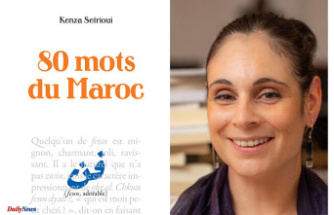The "Bumble" psychology expert Nicole Engel took a closer look at the topic of voice with the star and gave very interesting answers to five questions. Did you know, for example, that someone who uses cheeky jokes when they get to know each other may not be the funniest and most self-confident person, but rather insecurity probably plays a role.
How important is the voice of the other person psychologically in general? When people meet for the first time, as in dating, the so-called psychological concept of the Johari window takes effect. It says that the less I know about the other person, the more limited my scope for action is. The other represents a blind spot for me. That means when I first get to know each other: I can probably be less relaxed and authentic myself because I don't know what the other person likes. That unsettles me and none of us likes uncertainty. That's not sympathetic to us, so to speak. From a psychological point of view, the voice is also a relevant source of information in order to compare whether it could be a good fit with the other person or not. It gives me security in the dating process, then creates more trust and openness between two people and you find each other more sympathetic than, for example, just through pictures.
A recent survey also confirmed that for the overwhelming majority (75 percent) of people in Germany, their voice is a strong indicator of whether the romantic chemistry is right. And even for more than one in three (38 percent) between the ages of 18 and 34, hearing the voice can help them feel more confident, relaxed and comfortable before the first date. That's why the dating app "Bumble" has now launched a feature for audio questions, where you can hear the other person's voice before you like and match.
Can the color of the voice, intonation, etc. say anything about the person as a whole? A deeper, relatively emotionless, matter-of-fact voice has a calming effect on many people in terms of everyday psychology, while a nasal pronunciation comes across as somewhat arrogant. Emotions such as anger, joy or fear also become audible to others through subtle processes in the larynx muscles and are thus transported via our voice. Everyone knows, for example, a "shaky" voice when you're excited, when you're about to give a speech in front of a large group, or when you're very insecure about dating. You can also infer a person's personality based on their voice. Because the voice is characteristic of each individual and conveys personality attributes. For example, very fast-talking, vividly descriptive and emotionally charged voices indicate more dazzling, extroverted personalities.
Even mental and physical illnesses are reflected in the voice and way of speaking. The voice is often very quiet and depressed. We often draw conclusions about people as a whole based on the voice. It is important to be aware of the fact that so-called assessment errors can automatically come into play; like the halo effect for example. A cognitive bias, a trait of a person that is so dominant that it pushes others into the background. For example: A deep, smoky voice is interpreted as particularly masculine and protective by women; but in reality it can be exactly the opposite: decisive and authoritarian, more concerned with one's own needs.
Anyone who has an attractive voice for me is automatically attributed other good qualities: being strong and self-confident, intelligent, friendly, emotionally stable and socially competent. Another misinterpretation is the Horn effect. A saying that is too cheeky or a statement that is not compatible with my values can, figuratively speaking, ensure that I turn horns on my counterpart and want nothing more to do with him.
What kind of voice (stresses, speed, high or low) do men and women react most positively to? From a general psychological point of view, it is known that we humans find a full-sounding, medium-pitched voice pleasant. Accordingly, a sympathetic voice is rich in resonance and sonorous. A high, natural female voice tends to arouse protective instincts in men, for example. But as a woman, if I want a man to understand me deeply and really listen, I should speak slowly, firmly and more deeply. Because according to British researchers, men hear women's voices differently than men's voices (that's probably why women sometimes feel overheard - at work, but also in the dating process). For anatomical reasons, women speak in more complex, high frequencies (males are more likely to tire you out, like classical music) and male voices are generally deeper and, from a neuronal point of view, arrive more in the speech center of the hearing man.
Men have a different sense of hearing than women. And if communication doesn't work out right away, i.e. I don't feel properly understood, I'm happy to give the male counterpart another chance. Because often it is not a lack of interest, but plain and simple communication problems due to the different senses of hearing.
Anger, excitement and hysteria: are there psychological no-gos in dating that can deter the other person purely from the voice and less from the content? Too high, shrill voices are often perceived as "annoying" or very grumpy, deep voices are also common perceived as "unsympathetic". Mainly because they are often less easy to understand overall or cause stress in one or the other. The same applies to dialects: according to the "Bumble" study, for around 50 percent dialect plays no role and even 26 percent state that Bavarian is attractive, but stereotypes go hand in hand with it and people with dialects are said to have less competence in everyday psychology: that's how it works, for example Saxon less intelligent.
With voice messages, the first phone calls or the audio questions feature in the app: What should you look out for with your voice so that you come across as personable? It is important to remain yourself, not to pretend artificially and to remain authentic. Definitely don't try to be perfect. Because perfect is boring and the other person immediately perceives the whole thing as bending.
Of course you can be excited, but you shouldn't stutter, whisper or get bogged down when recording messages, the audio question or a first phone call. It is beneficial to speak slowly and clearly. Because our voice reveals a lot of what is going on inside us. It's not for nothing that we know how good friends are doing after just a few words on the phone. Tip: Before you start speaking, it always helps to get your body in good, comfortable tension: gently rock your neck back and forth, yawn, relax your abdominal muscles, shrug your shoulders up and down, and shake your hands. Then calm down and connect with your breathing for a moment. It is also important to use periods and pauses when speaking and to form short sentences.












